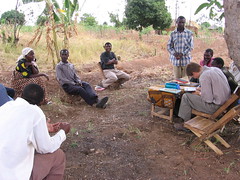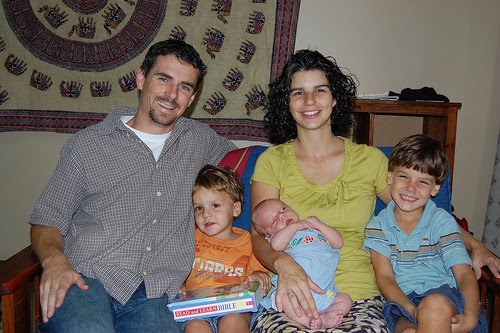
Small loans, crowded hospital rooms
Today, I had two distinct experiences, which I am hoping are not as distinct as I first thought.
In the morning, I traveled with Eric and Jason, two teammates, to a village where church leaders had assembled under a mango tree, surrounded by fields of cassava. While the setting—mango tree, vast horizon, slight breeze, searing sunshine, a generous meal, songs, prayers, scripture-reading, endless smiles and laughter—were just like any church meeting, the purpose today was different: to discuss money.
When the account book was opened, the discussions became intense. This group of Sukuma men and women, previously dominated by ancestral religion, jealousy, and fatalism, are hard at work forging a new future. The tool they are using today is microsavings and microloans.
The ifogong’ho, as such groups are called here, formed in 2004 as a response to needs such as medicine, transport, and other individual problems. Modest interest is charged on loans, the interest providing more capital for loans and also serves as potential funding for community projects.
The meeting was long, as all meetings here are (is this a universal cultural trait?), and on the surface the meeting was unspectacular (the largest loan discussed was equivalent to less than $10). But seeing this group struggle together, a group that never could have formed under the old worldview, was inspiring.
We left the meeting after lunch; Jason and Eric headed to a more remote village where people requested a showing of the Jesus Film. I traveled back by dala-dala to Bugando Hospital to check on Ruth. While Ruth was recovering nicely, my hour or so in the hospital looking for her and visiting with her was less than pleasant.
I view myself as pretty tough when it comes to hospitals. But I don’t even want to recollect what I saw and felt there, let alone retell it. But Ruthie is doing well, and will be discharged on Friday.
The two events—unrelated? Not exactly. It is my hope that the greater the impact the kingdom worldview has on communities, the more people are working together for the good of those around them, the greater amount of time will be spent enjoying company under mango trees, and the lesser time confined in crowded hospital wards.
At least, this is our hope.


1 Comments:
Hey!
for what its worth, the anual income of most working class in the U.S. in 1900 was $425. That was barely getting by, but you may not be too far off over there. I am no economist and the doller has definatly changed, maybe if they are only a hundred years or so off with everything it might not be too bad. We can hope anyway.
Love
David
Post a Comment
<< Home